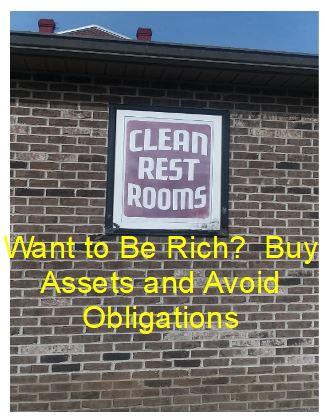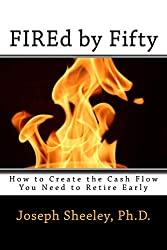
Psst…. Want to know what how to become rich? What differentiates the cash flow diagram of a rich person from that of a middle class person? Not, it isn’t the huge income – many people in the middle class have that. It is the presence of assets. Real assets. Not things like cars and boats and other things that decline in value. Things like a business, stocks, bonds, and real estate. Things that actually create an income stream all on their own. People who are rich, or who will become rich, buy assets. Constantly.
(Note, this site contains affiliate links. As an Amazon Associate I earn from qualifying purchases. When you click on an affiliate link and buy something, The Small Investor will get a small commission for the referral. You are charged nothing extra for the purchase. This helps keep The Small Investor going and free. I don’t recommend any products I do not fully support. If you would like to help but don’t see anything you need, feel free to visit Amazon through this link and buy whatever you wish. The Small Investor will get a small commission when you do, again at no cost to you.)
(If you enjoy The Small Investor and want to support the cause, or you just want to learn how to become financially independent, please consider picking up a copy of my new book, FIREd by Fifty: How to Create the Cash Flow You Need to Retire Early This is the instruction manual on how to become financially independent.)

And no, people don’t have assets because they’re rich. They are rich because they have assets. There are plenty of people who start out wealthy but lose it all because they don’t understand how to handle their cash flow. There are also plenty of people who go from the middle class to the ranks of the wealthy by managing their cash flow right. And if you have a middle-class income and don’t have some circumstance you can’t get away from like huge constant medical bills, you could be wealthy, too. And this all starts and ends with assets.
The Secret: Always be building up assets (stocks, bonds, real estate) and use the income from these assets instead of spending money from your salary as much as possible.
How do you find the money to do this?
Secret #2: Avoid taking on obligations – things that you have to pay for each month and in which you have no flexibility (car loans, subscriptions, credit card debt, etc…) – since they drain away your free cash flow, leaving you no money to invest.
If you want to learn how to make a cash flow plan to supercharge your income generation through assets, check out FIREd by Fifty: How to Create the Cash Flow You Need to Retire Early. In there I go through all of the steps for building the plan, optimizing your cash flow, then how to invest the money to make it grow. You can even calculate what you need to be putting away each month to reach your goals by a certain age.
What is an asset?
So what is an asset and what isn’t? An asset is something that increases your income. Each month, or each year, or maybe over a period of several years it produces more wealth than you put into it. A car is not an asset, even classic, collector cars since they never go up in value by more than the amount required to store, maintain, and insure them, especially if you consider inflation. A home is a borderline asset because it often costs you more to upkeep and pay for property taxes than you actually make in capital gains, although most people forget this when they sell twenty years later for twice what they paid.
Shares of common stock are an asset. Bonds are an asset. Real estate, where you are collecting rent in addition to getting increases in value due to inflation and growth of the area, is an asset. Put money into something like Home Depot stock and each year you collect dividend payments without you needing to do anything. Hold for long periods of time and you’ll see the value of the shares increase because the company is growing and becoming more valuable.

Want all the details on using Investing to grow financially Independent? Try The SmallIvy Book of Investing
The Parable of the Pipeline
A beautiful parable explaining the power of assets is given by Burke Hedges in the Parable of the Pipeline (look it up). In this parable, two brothers carry water for income. The first spends all that he makes and just thinks he can carry more water if he needs more money. The second spends his off hours and some of his income building pipelines. In the end, the brother who built the pipelines is able to generate all of the water he wants by throwing a valve, while the other brother becomes too old to carry buckets anymore.
When you’re young, you have lots of energy and you can make enough income to provide for yourself and your family through your labor alone. Eventually, however, you get tired of carrying buckets. If you have used some of your labor to build pipelines, you just thrown the valve open and relax. If you haven’t, you need to keep carrying buckets or live a desperate life if you’re too weak or sick to carry buckets anymore (or if you get laid off and can’t find a new job).
Instead of falling into the trap of spending everything that you make, forcing you to go to work every day just to maintain your lifestyle, use some of your income to build up assets. Put a percentage of your income into mutual funds. Start a 401K account and contribute regularly. Instead of spending your income from work on a vacation each year, take more modest vacations when you first start working and direct some of the money you would have spent into mutual funds. Then, as the income from the mutual funds increases, increase the scope of your vacations using the extra income from the mutual funds.
Obligations are your enemy
So, you’re probably thinking that this sounds great, but you never have any money left over at the end of the month to invest. If this is true, let me ask you this: How many obligations do you have? Obligations are things that you are required to pay. Things like a car payment, line-of-credit, subscription to NetFlix, etc…. You might also have expenses that are like obligations because you buy them regularly like clockwork. These are things like drinks after work every Friday and that $6 coffee on the way to work each day. Going out to eat all the time is a real killer of free cash flow.
If you can cut a few of these back so that you have $100 or $200 each month to invest, you’ll then be in the game. Even more than this, if you are buying things on credit, you’re paying more for them. If you put a vacation on a credit card and then pay it out over time, you might end up paying $5,000 for a $2500 vacation. That’s $2500 you could have invested if you had just skipped the vacation for now and gone somewhere much less expensive, waiting until you could afford to pay cash to take the big trip. With assets, you wouldn’t even need to work to pay the full cost of that trip since your assets would pick up part of the tab! See how this works?
Putting it into action
At first it may seem like you are getting nowhere. After all, if you stick $1000 into a mutual fund and it earn an average of 8%, you’ll add $80 to your income each year. Big whoop. Certainly not enough to quit your job over. If you keep buying more shares, however, and especially if you let the money you make from the mutual funds be reinvested back to buy more shares, you’ll see your income grow. In about 20 years, with regular investments, you’ll see the income from your assets equal your income from work. In another ten years, it will dwarf your work income. In ten more years you’ll be donating your salary to charity because you won’t need it anymore. It just takes regular investment over a long period of time.
So think of these ideas:
1. Instead of spending your salary on luxuries, create luxury funds (pools of assets like mutual funds) and spend a portion of your income from those assets on luxuries.
2. Automate withdrawals for things like retirement and college funds to ensure you keep building up assets.
3. Cut back on liabilities you don’t use constantly – things that drain money from your net worth like boats and time shares – and instead rent things when you want to use them.
4. Each time you see an increase in your salary, put half of it into buying assets and half into increasing your lifestyle.
Need more help on figuring out ways to save and invest? Check out The SmallIvy Book of Investing which goes through all sorts of ways to cut your expenses and then how to invest.
Have a burning investing question you’d like answered? Please send to [email protected] or leave in a comment.
Disclaimer: This blog is not meant to give financial planning or tax advice. It gives general information on investment strategy, picking stocks, and generally managing money to build wealth. It is not a solicitation to buy or sell stocks or any security. Financial planning advice should be sought from a certified financial planner, which the author is not. Tax advice should be sought from a CPA. All investments involve risk and the reader as urged to consider risks carefully and seek the advice of experts if needed before investing.
